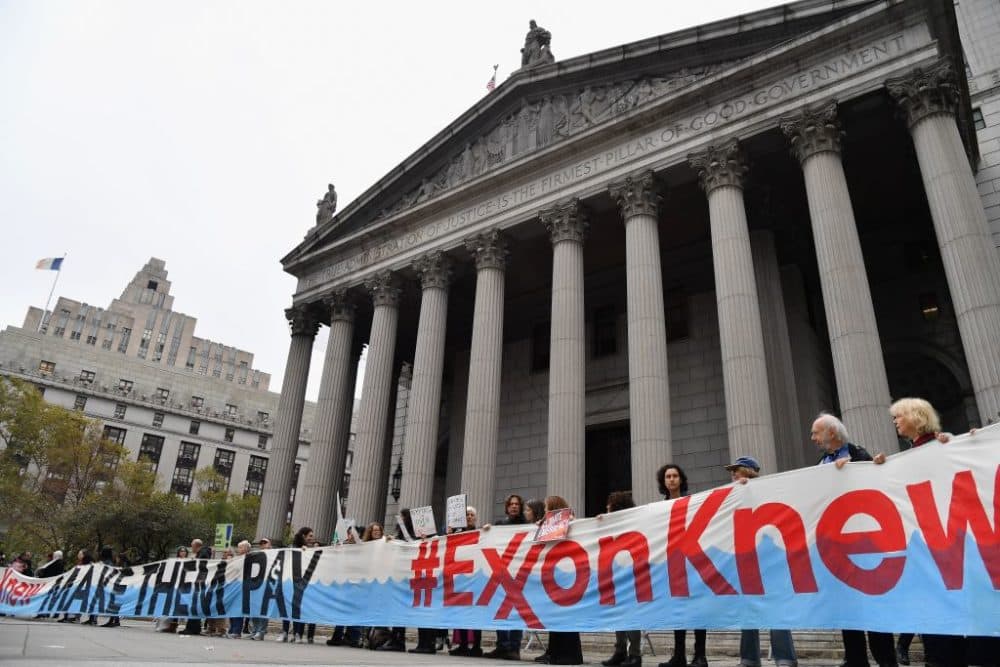Advertisement
Commentary
States took Big Tobacco to court and won. Can they now beat Big Oil?

State attorneys general from around the nation, including here in Massachusetts, are suing fossil fuel companies over climate change. Late last month, the state’s highest court rejected ExxonMobil’s bid to dismiss a lawsuit by Attorney General Maura Healey. And yes, you’ve seen this movie before.
There is compelling evidence, in the public eye for several years now, that the fossil fuel industry used the same playbook as the tobacco industry to spread disinformation, sow doubt, and deflect responsibility for the dangers of its products. When their own research revealed the harms they were inflicting, both industries responded with a strategy of denial and deception.
The states took Big Tobacco to court, and they won. The 1998 Master Settlement Agreement imposed tight restrictions on how tobacco companies can promote cigarettes, and requires tobacco makers to pay billions of dollars in damages to the states annually, for as long as they do business in the U.S.
The tobacco agreement was the culmination of almost 50 years of legal challenges.
What might a settlement between Big Oil and the states look like? And what effect would it have on our transition to cleaner energy sources and the course of the climate crisis?
[R]ulings against the fossil fuel industry could expedite the energy transition and help states become more climate-resilient.
Legal decisions in the 1990s didn’t eliminate cigarettes, but adult smoking rates did decline markedly in the first two decades of this century. Exactly how much of the drop is attributable to court findings against Big Tobacco is indeterminable, but it’s plausibly significant. The industry’s settlement funded national anti-smoking programs. It also necessitated price increases that made smoking less accessible to vulnerable populations, especially young people.
Analogously, court decisions alone won’t spell the end of the climate crisis, but there are several ways in which rulings against the fossil fuel industry could expedite the energy transition and help states become more climate-resilient.
Cash, of course, is always useful — and welcomed. All the states will feel the effect of the warming climate in some fashion, and they’ll need to spend large sums on adaptation. When the tobacco settlements were being doled out in the late 1990s, all 50 states, the District of Columbia, and five territories lined up to get their share of the pot.
In the ongoing 2019 Massachusetts v. Exxon climate case, the state has asked the court to compel ExxonMobil to pay damages — likely in the billions of dollars — related to violations of the state’s consumer protection laws and efforts to mislead the public. But beyond the monetary compensation, a victory for AG Healey would amount to only an injunction against ExxonMobil’s greenwashing and deceptive marketing.
Local governments in California are pursuing a more ambitious lawsuit. They are suing fossil fuel companies for the cost of physical damages due to climate change, including sea-level rise.
An even more ambitious model is a 2021 case in the Netherlands. An environmental group successfully sued Shell, and the court determined that the corporation must reduce its carbon emissions on an accelerated schedule. Dutch law is not American law — and Shell will appeal — but this ruling stands out because the court dictated that a major corporation must take action to mitigate the global climate crisis. It’s analogous to a court ordering a tobacco company to reduce carcinogens in cigarettes — a ruling that was never handed down.
A steady drip, drip, drip of negative publicity degrades the reputation of the industry and limits its ability to drive the conversation around the energy transition.
The many states with cases now in court against Big Oil — including Massachusetts, Rhode Island, Vermont, Connecticut, Maryland, Colorado, and New York to name a few — probably won’t succeed in landing as heavy a blow as in the Dutch ruling. But even modest success in these cases could, in the aggregate, create headwinds for the fossil fuel giants and undermine their financial stability.
Being forced to pay out billions in damages year after year could cut into profits and make investors uneasy. It could become harder to raise the capital needed to sustain growth; a downward spiral toward bankruptcy or consolidation might ensue.
And even if the states lose, media coverage of a long and nasty legal battle would amplify the narrative that Exxon and others knew long ago that burning fossil fuels would have catastrophic effects, and that the industry tried to hide it. A steady drip, drip, drip of negative publicity degrades the reputation of the industry and limits its ability to drive the conversation around the energy transition.
Like the fossil fuel divestment movement, the legal movement against Big Oil helps to undermine the industry’s social license to engage in environmentally destructive business practices. According to Daniel Farber, a professor of law at the University of California, Berkeley, which side emerges victorious from these cases is secondary: “The real stakes of the litigation thus may rely not so much on outcomes, but rather on the facts brought to light in the process.”
Can a barrage of court cases make fossil fuels socially and politically unacceptable? The history of tobacco litigation supports the idea that products previously unquestioned can become stigmatized and, to a degree, marginalized. Nevertheless, more than two decades after the Master Settlement Agreement, the tobacco industry is still highly profitable, and tens of thousands of smokers still die of lung cancer every year in this country.
Let’s hope for a more decisive victory when the current wave of climate litigation is complete.
